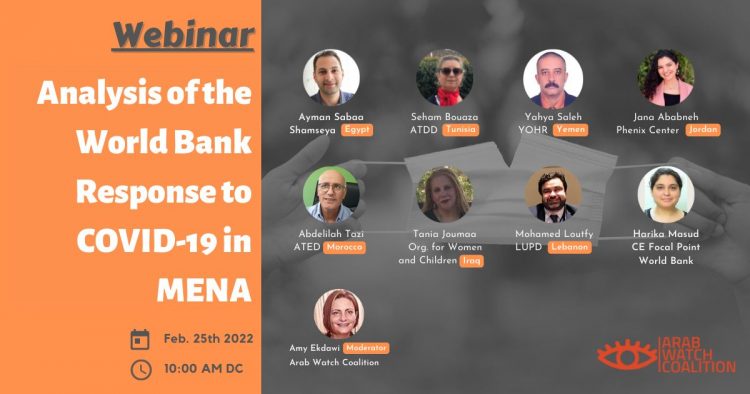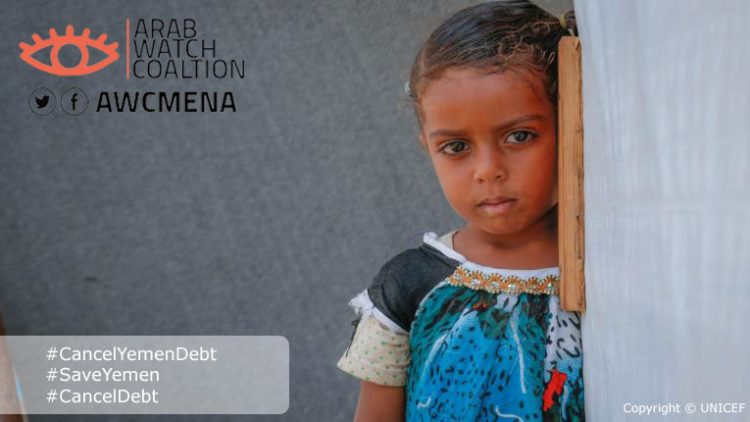Yemen
AWC has four members in Yemen and works also with non-member organizations.
AWC monitors the policies and activities of the following International Financial Institutions (IFIs) in Yemen:
International Monetary Fund (IMF)
Yemen became a member of the IMF as the People’s Democratic Republic of Yemen in 1969. The Yemeni government received its first loan from the IMF in 1996. Since then, Yemen has obtained seven loans from the IMF.
The IMF periodically assesses the Yemeni economy through a process known as Article IV Consultation, named after Article IV of the IMF’s Articles of Agreement, which outlines the IMF’s surveillance role.
World Bank Group (WBG)
Yemen joined the World Bank Group in 1969. Over the years, the bank has invested in 240 projects in Yemen’s public sector. As of July 2024, the World Bank has 16 active projects and 1 project in the pipeline (under preparation) in Yemen.
The International Finance Corporation (IFC), the private sector arm of the World Bank Group, currently has 9 active projects in Yemen.
The World Bank’s latest Country Engagement Strategy for Yemen covers the period of 2022-2023.
Main issues that AWC focus on in Yemen
Yemen is the poorest country in the Arab world and one of the poorest countries in the world. It has been torn apart by a bloody civil war since 2014, leading to deep divisions in the country and society at all political, economic, and social levels on sectarian and separatist grounds. Yemen now has two executive, legislative, and judicial branches and other militia-controlled power areas spread throughout the country. These divisions and armed conflicts have caused a comprehensive collapse at all humanitarian, social, and economic levels, as Yemen faces one of the worst humanitarian crises in the world. More than 80% of Yemenis live below the poverty line, and the unemployment rate is around 80%, in addition to the interruption of the salaries of about 500,000 civil servants in the northern governorates for a period of 7 years. With the continuation of the war and conflict, public services, especially health services, have deteriorated, leading to the spread of epidemics. External transfers have also declined, and the role of the private sector has shrunk.
The World Bank Group has a portfolio of investments in small projects in Yemen, most of which are concentrated in the service and relief sectors and are implemented in cooperation with UN organizations. This is in addition to small investments with the private sector through the International Finance Corporation (IFC), the World Bank’s arm that deals with the private sector. Yemen has not received any loans from the International Monetary Fund recently. However, the Fund is still conducting a periodic assessment of the Yemeni economy, according to Article IV of the Fund’s charter, which states that the Fund shall provide this service to all member countries. The Fund also provides technical assistance and advice to the Central Bank of Yemen in the area under the control of the legitimate authority.
The situation of armed conflict and civil war has had a severe impact on the state of rights and freedoms, and the increasing security clampdown on civil society and its activities and its ability to obtain the necessary funding to carry out its activities, especially in areas under the control of the de facto authority (Houthis) and to a lesser extent in areas of the so-called legitimate government. Internal events and relief and service work consume the efforts of Yemeni civil society. Coalition members in Yemen have been actively monitoring the implementation of the World Bank-funded COVID-19 program, which the World Health Organization was implementing.
AWC activities in Yemen
On the 21rd of July 2020, Yemeni civil society representatives, including our members and partners, sent an appeal to the World Bank board of directors asking them to Cancel Yemen debt and help saving the country. AWC supported this demand in solidarity with the Yemeni people who are suffering for years to be able to have a decent life.
AWC, and its Yemeni members and partners, are monitoring closely the IMF, WB and other IFIs loans and their conditionality in Yemen. As well as the special programs and projects that aim at easing the economic impacts of the Covid-19 pandemic.
AWC partnered with “Yemen Observatory for Human Rights” to monitor and analyze the impacts of the World Bank’s Yemen COVID-19 Response Project. This program aims to help Yemen face the challenges of the Covid19 pandemic.




